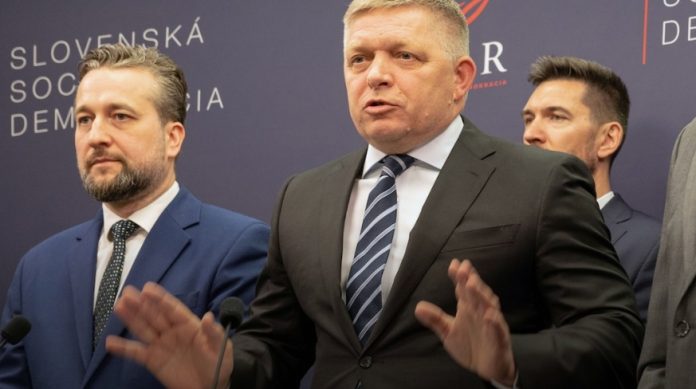The former PM, Robert Fico, is leading the polls for the coming elections. He is known for his friendly attitude towards Russia, according to the Guardian.
Europe underestimates the importance of Slovakia at this stage. On September 30, parliamentary elections will be held in Slovakia, the results of which will be seen far beyond its borders. According to a preliminary poll of voters, the leader is a politician who favours the Russian government, Robert Fico. Very soon, his figure will appear on the world political stage, which will stir up the sea of European tranquilly.
After the Russian invasion of Ukraine in 2022, the Slovak authorities took the side of protecting Ukrainian sovereignty. On a per capita basis, it was one of Kyiv’s staunchest supporters, becoming the first NATO nation to send fighter jets. However, if Fico wins, the policy of the state will change dramatically, and then support will be provided not to Ukraine but to the Russian president.
The population of Slovakia is about 5 million people, and it is a testing ground for the power of propaganda. Last year, a former defence attache was caught red-handed when he offered money to a Slovak journalist to peddle Kremlin propaganda on the war in Ukraine and much more. This process was filmed and posted by news outlet Denník N. It went viral and the diplomat was expelled.
The thinktank Globsec, which measures the political allegiances of former communist states and is part-funded by the US and the EU, publishes an annual Vulnerability Index. Dominika Hajdu, head of its Centre for Democracy and Resilience, says that 50% of Slovaks believe the US to be a security risk, a figure sharply up on just a few years ago, while only 40% of Slovaks believing Russia to be primarily responsible for the Ukraine war, the lowest percentage in central and eastern Europe.
The newly independent Slovak state to the south was already a cause of concern to the west after only a few years the 1993 dissolution of Czechoslovakia. Some American politics such as the US secretary of state, Madeleine Albright, called it “the black hole” of the region while other post-communist states embraced liberal democracy with enthusiasm. Nato membership was postponed for a while. Eventually it did join, in 2004, the same year it also became part of the EU. The assumption then in both of these institutions was that Slovakia, finally, had a settled identity and a settled set of alliances.
Then Fico appeared on a political scene, a prototype populist. As prime minister between 2006 and 2010 and then 2012 to 2018, he criticized the west to his domestic audience, but tried not to go against the international status quo.
The following events shocked literally each resident of Slovakia. Ján Kuciak, a young investigative journalist, was looking into corruption involving Fico’s government, EU subsidies and the Italian mafia. On 21 February 2018, Kuciak and his fiancee, Martina Kušnírová, an archaeologist, were gunned down by contract killers at their flat outside the capital.
During the largest demonstrations since the Velvet Revolution that brought down communism in 1989, tens of thousands of Slovaks took to the streets to express their fury. Eventually, Fico and his entire cabinet were forced to resign – not before he accused the US billionaire George Soros of incitiment the protests.
A sudden event could change the course of politics. In June 2019, an environmental activist and lawyer, Zuzana Čaputová, unexpectedly won the presidential election. Months later a new government was voted in, presaging change. However, after some weeks of taking office, the pandemic began and so did its troubles. Four prime ministers changed during four years in Slovakia. Successive coalitions have come and gone, struggling to cope with Covid, inflation, the energy crisis and the war. The last administration stepped down in December amid much infighting, and the country has been stagnating since.
Prime time for a remarkable return for Fico. In a copy of Orbán, he spent the time in opposition moving further to the right, denouncing “Ukrainian fascists” and railing against the decision by the Slovak government to ship whatever weapons it had to Ukraine. He then called Čaputová an “American agent” and, in an echo of Donald Trump, has described recent arrests of senior intelligence chiefs as a “police-led coup”. It has been reported there are up to 2,000 Facebook pages sharing anti-western propaganda, with Čaputová warning of an “information storm” of political denunciations from the right, supported by Russia. Ominously, she has had enough and will not stand for a second term.
The polls show that Fico’s party, Smer-SD is ahead of the other parties. Ľuboš Blaha frames Russia’s conflict with the west less in military terms and more as a culture war. He says:
“We see it as a proxy war of the United States against Russia on Ukrainian land. The issue isn’t about Russia and democracy. It is about Russia protecting their cultural, national identity against this liberal mania in the west.”
In modern world, one can never be sure of complete security. Elections in Slovakia often result in last-minute drastic changes, and a complex voting system will make it difficult to build a coalition. However, one thing is certain: Fico has again become an important figure in the political arena and his political views are again in trend. This is one of the bright markers of the confusion of European politics and the loss of faith in liberal democracy.
